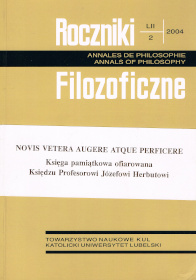Pragmatic Ethics: Morality as a Habit
Abstract
The paper discusses the basic assumptions proposed by John Dewey in his pragmatist ethics, posing at the same time a question whether pragmatist ethics satisfies the basic conditions of the ethical theory. The central category and criterion assumed in pragmatist ethics is a habit. Only good habits ensure good action. Habits are shaped by the milieu, and any attempts to change them entail a change in the conditions of the milieu. Permanent modification of habits is written in the basic goal of moral action, i.e. development. Dewey rejects the theory of ethics comprehended as an order of moral norms and evaluations settled in advance. The theory proposed by him does not satisfy the conditions that a standard ethical theory is supposed to meet. This does not mean that it cannot be called a theory. It is Dewey's programme to give up traditional tasks assigned to an ethical theory.
Copyright (c) 2004 Roczniki Filozoficzne

This work is licensed under a Creative Commons Attribution-NonCommercial-NoDerivatives 4.0 International License.





